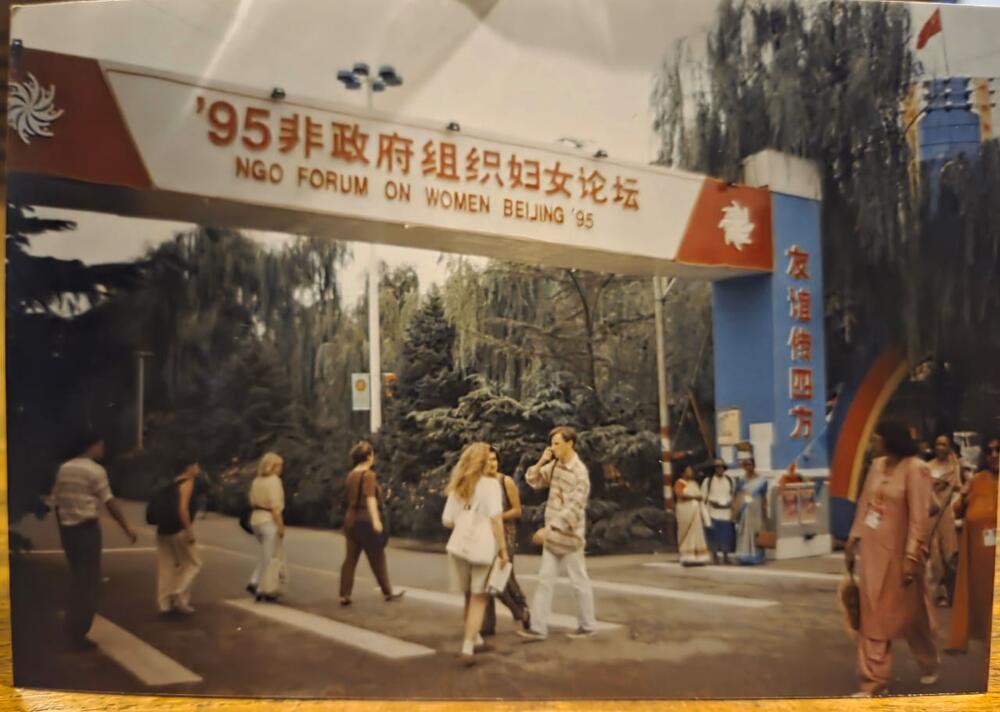UNFPA Sri Lanka marks 30 years since the 1995 Beijing Declaration and Platform for Action — a historic turning point for the global women’s movement.
In a powerful reflection, Kumudini Samuel, a key voice from Sri Lanka’s delegation, shares what Beijing meant then, and why it still matters now.
“We are here to celebrate the gains of Beijing, to resist any rollback, and to reclaim and transform the progress made over the past 30 years.”
Beijing was more than a conference — it was a moment of transformation.
In 1995, the Fourth World Conference on Women in Beijing marked a historic turning point for gender equality and women’s rights. For many women across the globe, including those from South Asia, it was a moment of global visibility, inclusion, and power. It was the moment when women became an integral part of global decision-making, shaping the 21st century, transforming the existing world order, and defining new alternatives.
The 1990s were a unique era—an affirming multilateral space for feminist organising. For activists from South Asia, Beijing came in the wake of mounting challenges: rising religious fundamentalisms, chauvinistic nationalisms, and serious development crises.
Beijing followed a series of four critical UN World Conferences:
-
The World Conference on Environment and Development (Rio, 1992)
-
The World Conference on Human Rights (Vienna, 1993)
-
The International Conference on Population and Development (Cairo, 1994)
-
The World Summit for Social Development (Copenhagen, 1995)

Activists brought the gains from these global forums to Beijing, enabling them to influence the Beijing Declaration and Platform for Action. Key contributions included:
-
A redefinition of poverty and development
-
Framing sexual and reproductive health and rights within the context of human rights
-
Asserting women’s rights to life, liberty, security, and an adequate standard of living as fundamental to development
-
Reaffirming, from Vienna, that women’s rights are universal, inalienable, and indivisible—never subordinate to culture or religion
-
Recognising the elimination of violence against women, in both public and private spheres, as a human rights obligation of the state
Beijing enshrined the idea that women’s rights are human rights.
How Did We Get to Beijing?
The journey to Beijing was one of extraordinary effort and grassroots mobilisation. Long before mobile phones and the internet, activists reached one another through letters, aerograms, telexes, and trunk calls made via post offices.
Solidarity was built slowly—through consensus-building, fact-finding missions, and tribunals. These efforts gave voice to the local and made them visible on the global stage.
In Beijing, 30,000 women came together—many for the first time. From Sri Lanka, the Women’s NGO Forum mobilised 50 activists, led by Kumudini Samuel. The group was made up of women from diverse backgrounds—class, religion, ethnicity, and region. Three participants risked crossing an active war zone just to reach Colombo and then Beijing.
Beijing was a celebration of internationalism, solidarity, and feminist strategy. Women expressed themselves through songs, dance, theatre, and posters. But most importantly, they were:
-
Speaking directly to states
-
Drafting language alongside policymakers
-
Being included in the negotiations and decisions
They were not co-opted. Not tokenised. Not excluded.
Three Decades Later
As the world marks 30 years since the Beijing Conference, the message is clear: we must resist the rollback, reclaim our shrinking spaces, and safeguard the spirit that Beijing ignited.
It is time to protect and transform the gains made—gains built through vision, courage, and collective action.



